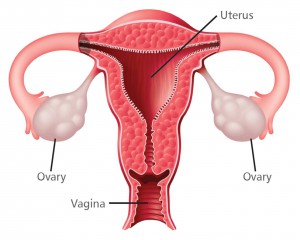
It is one of the most common cancers in women after breast and cervix cancer. It is called a ‘silent killer’ as it is asymptomatic in early stages and 75 per cent of cases are diagnosed in the advanced stage. A woman’s lifetime risk of dying from ovarian cancer is 1.1 percent.
Ovaries are small, oval-shaped glands located on either side of your uterus. They produce and store your eggs and make hormones that control your menstrual cycle as well as pregnancy.
Ovarian cancer is a growth of cells that form in the ovaries. These multiply quickly and can invade and destroy healthy body tissue. It largely means tumours of epithelial origin, but it can also arise from other elements namely germ cells and stroma. Epithelial ovarian cancers typically occur in postmenopausal women and are in an advanced stage at the time of diagnosis, whereas germ cell tumours occur at a young age, are detected in the early stages and are completely curable.
Who are at risk?
The majority of women with ovarian cancer have no known risk factors. Early menarche, late menopause, being over the age of 30 at first childbirth, and nulliparity are said to increase the risk.
What are the protective factors?
Childbirth, breast-feeding, oral contraceptives, tubal ligation, bilateral removal of ovaries (bilateral oophorectomy), and hysterectomy.
What are the symptoms?

Early-stage ovarian cancer usually does not cause any symptoms, which can lead to missed diagnoses
Symptoms NOT to be ignored are are non-specific like pelvic pain, back pain, abdominal discomfort, bloating, early satiety, vaginal bleeding, and frequent urination.
Ovarian masses are sometimes detected on pelvic examination.
How is it diagnosed?
Transvaginal Ultrasound (TVU) is an important diagnostic tool in evaluation of patients with pelvic mass. Computed Tomography (CT) and Positron Emission Tomography (PET scan) help in defining the extent of the disease. MRI is sometimes helpful. Tumour markers like CA 125 are adjunct to imaging and useful in follow up.
Are all ovarian masses cancers?
All masses in the ovary are not cancers. TVU helps distinguish benign from malignant ovarian cysts. Complex cysts, defined as cysts with both solid and cystic components, septations and echogenicity, are malignant and require exploration. In contrast simple cysts that are thin walled, less than 5-10 cm and without septations are usually benign.
Can we detect Ovarian Cancer early?
Screening for ovarian cancer has not been successful as the natural history of ovarian cancer is not well understood. There is no well-defined precursor lesion and the length of time from localised tumour to dissemination is unknown. Multiple efforts are underway to develop effective screening methods. Pelvic examination, CA 125, and TVU with Doppler are studied as screening methods in high-risk individuals.
Is ovarian cancer genetic?
Around 5-10 per cent of patients carry germline mutation. Breast-ovarian cancer syndrome accounts for approximately 90 per cent of hereditary ovarian cancer and is suspected whenever there are multiple affected family members with bilateral or early onset breast cancer, both breast and ovarian cancer in the same individual, or a male relative with breast cancer.
What are the treatment modalities for Ovarian Cancer ?
Ovarian Cancer Treatment depends on the age, stage, tumour type and the desire to preserve fertility. Surgery and chemotherapy is the mainstay of treatment.
To know more details about Latest, Most Advanced and Affordable Ovarian Cancer treatment option available at World Class Hospitals in India, please click this link below
How do I prevent Ovarian Cancer ?

There is no known way to prevent ovarian cancer, but some things are associated with a lower chance of getting it.
- Consume a nutritious diet. – Foods like beans, eggs, nuts, and other foods that provide Vitamin D are recommended as well as foods high in Vitamin A like carrots, leafy greens, and sweet potatoes. Women who have a history of taking oral contraceptives are studied to have up to a 50% lower risk of developing ovarian cancer.
- Exercise regularly.
- Maintain a healthy body weight.
- Do not smoke or use other tobacco products.
- If appropriate, use oral contraceptives.
- Give birth and breastfeed, Breastfeeding. Some studies suggest that women who breastfeed for a year or more may have a modestly reduced risk of ovarian cancer.
- If appropriate, undergo a tubal ligation procedure to prevent pregnancy.
- If recommended for a medical reason in addition to ovarian cancer risk reduction, undergo a hysterectomy.
- Undergo a prophylactic oophorectomy to remove one or both ovaries.
- Do not use hormone replacement therapy after menopause.
Because of high mortality of ovarian cancer and lack of effective screening and preventive approaches, risk of ovarian cancer does not rise dramatically until the late 30s in women with germline mutation, so women have the opportunity to complete their family prior to surgery. With the new trends in chemotherapy, survival is increasing in ovarian cancer patients and awareness is necessary among the public for seeking early medical attention.
To know more about most Advanced and Affordable ovarian cancer Treatment at World Class hospitals in India Please visit https://safemedtrip.com/medical-services/cancer-treatment-in-india/ovarian-cancer-treatment-in-india.html

 Click to WhatsApp
Click to WhatsApp +91-9899993637
+91-9899993637



